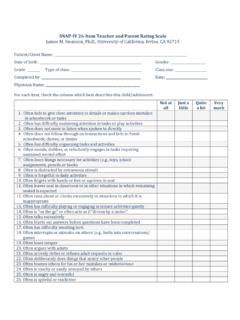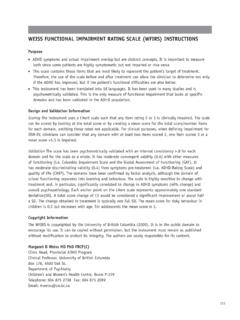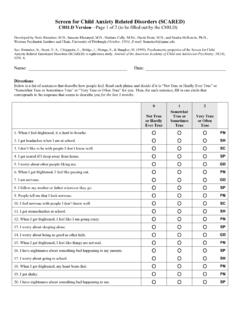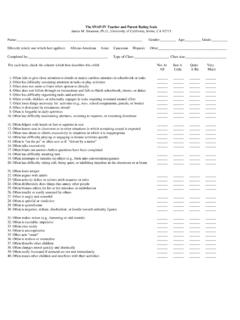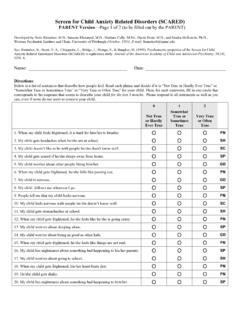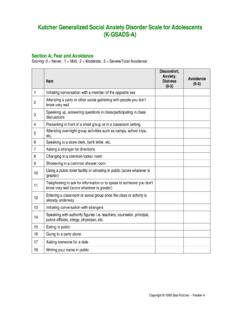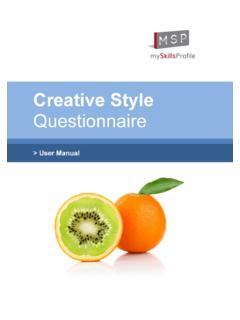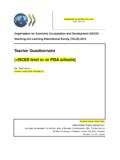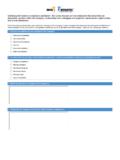Transcription of Youth Questionnaire-Page 1 - Shared Care
1 Page 1 of 2 CHILD & Youth MENTAL HEALTH GENERAL SCREENING QUESTIONNAIREC ompleted by Youth Aged 12 or OverThis information will assist your family practice team in providing the best possible care for you and your answers will be kept strictly confidential as part of your medical the questionnaire is voluntary and will not affect the health care you receive from your family you have questions or want help filling this out, please ask a member of your family practice of Family Doctor: _____Date:_____Your Name: _____Who currently lives in the family home? (List name(s) and relationship(s), for example, mother, brother, etc.)_____Are you currently attending school? Yes/NoName of School:_____Grade _____1. What are your reasons for talking with a counsellor? (Check off all that apply) School problems Friendships Family Bullying or teasing Feeling down or sad Feeling worried or stressed Temper Alcohol, drugs or gambling Sleeping problems Eating or body image Other (please explain) _____2.
2 How long has this been a problem? (circle one)Less than 3 months3 to 6 months6 to 12 months1 to 2 yrs3. Because your privacy is important to us, do you have a cell phone or alternative number youwould like us to call?Yes/NoNumber to call:Would you prefer we contact you on your cell phone #or by e-mail?4. Can we leave a message at your home number?Yes/NoBCFPI Youth Self Report Brief Screen DRAFT BCFPI Inc. 2009 Page 2 of 2 Your Name:Male Female Age:Date of Birth:daymonthyearToday's date:daymonthyearBelow are examples of problems which people sometimes have. Please circle whether each is NEVER true, SOMETIMES true, or OFTEN true of distracted, have troublesticking to activities012fail to finish things you start012have difficulty followingdirections or instructions012impulsive, act without stoppingto think012jump from one activity , talk back to adults012blame others for your ownmistakes012easily annoyed by others012argue a lot with adults012angry and things at home012destroy things belonging toothers012damage school or otherproperty012broken into someone else'shouse.
3 Building or car012physically attack people012use weapons something bad will happento people you are close to012worry about being separatedfrom those you are close to012scared to go to sleep withoutparents nearby012overly upset when leavingsomeone you are close to012overly upset while away fromsomeone you are close to012feel sick before being separatedfrom those you are close about doing better at things012worry about past behaviour012worry about doing the wrongthing012worry about things in the future012afraid of making mistakes012overly anxious to please interest in your usual activities012get no pleasure from your usualactivities012trouble enjoying yourself012not as happy as other children012feel hopeless012unhappy, sad, or Tool Recommendations BCFPI Inc. 2009 CHILD & Youth MENTAL HEALTH GENERAL SCREENING QUESTIONNAIRERECOMMENDATIONSI nstructions for using the information from the questionnaire :1.
4 Review page 1 information provided by the Score series of questions on page Add scores in each 1:The questions in this section relate to regulation of attention, impulsivity and activity. A scoreabove 7 is considered elevated relative to normed values for 6- to 18-year-olds. For screeningtools and additional information aboutADHD, see theADHD 2:The questions in this section relate to oppositional/co-operative behaviour in relationships. Ascore above 7 is considered elevated relative to normed values for 6- to 18-year-olds. Forscreening tools and additional information aboutOppositional Defiant Disorder (ODD), see theBehaviour Problems 3:The questions in this section relate to conduct problems. A score above 0 is considered elevatedrelative to normed values for 6- to 18-year-olds.
5 For screening tools and additional informationaboutConduct Disorder (CD), see theBehaviour Problems 4:The questions in this section relate to separation anxiety. A score above 6 is consideredelevated relative to normed values for 6- to 18-year-olds. For screening tools and additionalinformation aboutseparation anxiety, see theAnxiety Disorders 5:The questions in this section relate to managing anxiety. A score above 6 is considered elevatedrelative to normed values for 6- to 18-year-olds. For screening tools and additional informationaboutGeneralized Anxiety Disorder, see theAnxiety Disorders 6:The questions in this section relate to managing mood. A score above 5 is considered elevatedrelative to normed values for 6- to 18-year-olds. For screening tools and additional informationaboutmood disorders, see theMood Disorders C&Y Mental Health General Screening questionnaire is not a diagnostic tool.
6 Although it supports theidentification of common mental health problems, it may miss some or over-estimate others. TheQuestionnaire facilitates the communication of clinical information when consulting with, or referring to, amental health specialist. It should be interpreted by a qualified mental health provider or physician withtraining in psychometric interpretation.
